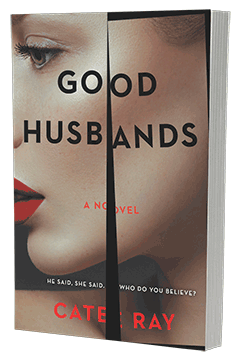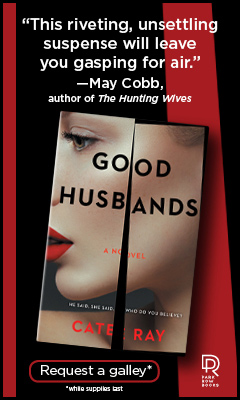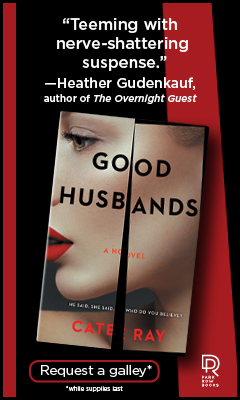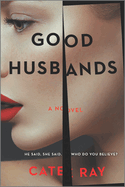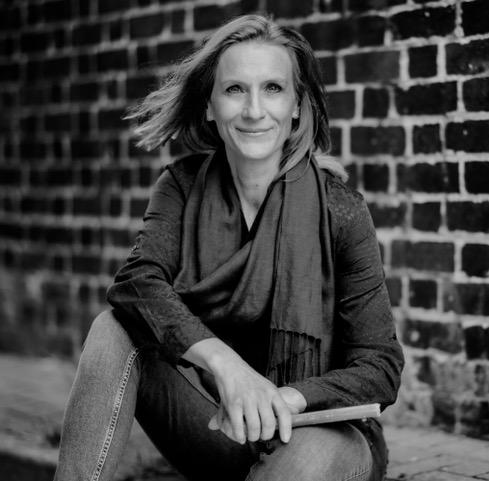Good Husbands
by Cate Ray
Good Husbands, the new domestic suspense novel from Cate Ray (who's previously written under the name Cath Weeks), teases both allure and horror out of the old adage You never really know a person. There's a cruel but undeniable thrill in watching the three female protagonists of Ray's book discover, one by one, that the men they love might have done something unforgivable. "Men are the worst" isn't exactly a revelation in the #MeToo era, yet there's still something revelatory about how these three women come to recognize that the men they've married are not the men they thought they married at all. Any reader--regardless of gender identity--will wonder if they, too, are capable of being duped. And, if they can be duped, who else might fall victim?
That's the conflict at the core of Good Husbands: three English women--Jessica, Stephanie and Priyanka--each separately receive an unexpected letter in the mail, one that reveals a tragedy. Holly, the letter writer, is the child of rape, and her father--allegedly--is the husband of either Jessica, Stephanie or Priyanka. How does she know? She claims their husbands all assaulted her mother at a private club in December 1990, an event that derailed both her mother's life and her own.
Each wife reacts differently to the allegation, both in the immediate moment after reading the letter and also as the novel progresses and they dig deeper into the mystery. These varying viewpoints are purposeful: each represents a common response within larger society. One wife leans on "she asked for it" denial. Another toes the line between acceptance and disbelief, hungry for some objective truth. The third throws her chips in with the accuser, a "believe women" moment for the ages. All of them, understandably, are guilt-ridden and in mourning as their previously happy--or so they seemed--marriages are changed irrevocably. As they join forces and track down answers, they begin to ask themselves: How do you look at your partner the same way, knowing they're capable of such darkness? Or is everyone capable of such darkness? And, besides, what if it was all just a horrible accident?
In Good Husbands, readers will recognize plenty of callbacks to reality. In one particularly ripped-from-the-headlines moment, a husband blames "the PC brigade" for "getting to" his wife once she expresses her fury. Only when she threatens the collapse of their marriage does he himself crumple: "Don't break up our family. I love you, baby." Another husband employs a different, more manipulative tactic: "Haven't I been good to you? Haven't I cared for you and your girls--provided for you? I deserve a little loyalty, surely? You should believe me over anyone." These lines are painful, even grotesque, because they're familiar. These men seem incapable of truly understanding the harm they've caused, a theme many readers will find discomfortingly prescient.
Ray toys with these heavy themes without letting that weight overpower her novel. For all its intensity, Good Husbands is breezily written and dialogue-heavy, an ideal stay-up-all-night binge for domestic-suspense fans. It joins a cohort of recent thriller novels and television series that take an unsuspecting woman and force her to confront the misdoings of her husband, the person to whom she's tied her career, children and well-being. No, she didn't make the choices he made, the ones that created a crime. But she did marry him. She did, perhaps, make excuses for him. She did, maybe, turn a blind eye. So does that make her an accomplice? And how does she change, even if her husband cannot?
These are intriguing questions, challenging but not impossible to grapple with in commercial fiction. After all, fiction makes these questions open to greater, accessible debate; it's why television series such as The Undoing, Anatomy of a Scandal and Big Little Lies--all based on books--have succeeded. Ray understands something about these stories: they're powerful only because they're personal. By placing readers directly in the fallout zone of a sexual assault allegation, no one can look away unless they close the book. And who wants to close an addicting book?
Although Good Husbands isn't exactly a whodunit, it has the benefit of a surprising twist at the end. Ray, as she nears that ending, never loses sight of her protagonists' nuances; they are the ethical heartbeat of the book. Ray tries not to valorize Jessica, Stephanie and Priyanka. (Even the letter writer's own nuances are eventually laid bare.) Ultimately, Good Husbands is more than just a delicious thrill ride; it is a deeply thoughtful exploration of how a husband's transgression reverberates through his entire family. The complexities Ray explores here offer ample book-club material. --Lauren Puckett-Pope



